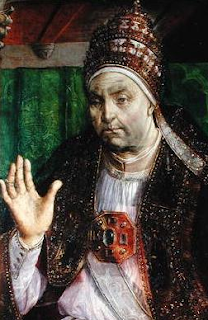 |
| “God and I decree and grant that, if you give a certain sum of money for the repair of the church, your relative gets out of Purgatory”. |
Roman Catholics tell us that it was the abuse of Indulgences, not the Indulgences themselves, that caused the Reformation. They say The Catholic Church does not now nor has it ever approved the sale of indulgences.
They say “the Church has never taught the selling of indulgences”, meaning it was never a doctrine, and in this, they comfort themselves. It’s not one of those two or three ex cathedra statements that has been issued all through history, and so, a miss is as good as a mile. No harm, no foul, eh?
At some point, though, you’ve got to stop with the scholastic hair-splitting. If it looks like a duck and walks like a duck and has a bill like a duck and quacks like a duck, at some point you are justified in saying, “it really is a duck”.
Well, in this case, it is as close to a doctrine as you can get without it being an “ex cathedra teaching”. Here (while looking up other things), I found this “plenary indulgence”, (with “plenary” meaning “total”) issued by a pope, given in exchange for money.
Denzinger (©1954): 723a In order that the salvation of souls may be procured rather at that time when they need the prayers of others more, and when they can be of benefit to themselves less, by Apostolic authority from the treasure of the Church wishing to come to the aid of the souls who departed from the life united with Christ through charity, and who, while they lived, merited that they be favored by such indulgence; desiring this with paternal selection, in so far as with God's help we can, confident in the mercy of God and in the plenitude of His power, we both [that is, “we the Pope, and God”] concede and grant that, if any parents, friends, or other faithful of Christ, moved in behalf of these souls who are exposed to purgatorial fire for the expiation of punishments due them according to divine justice, during the aforementioned ten year period give a certain sum of money for the repair of the church of Xancto, or a value according to an arrangement with the dean or overseer of said church, or our collector by visiting said church or send it during said ten year period through messengers delegated by the same, we grant as a suffrage a plenary remission to assist and intercede for the souls in purgatory, in whose behalf they paid the said sum of money or the value, as mentioned above, for the remission of punishments.
Denzinger, at least, thought highly enough of this statement to place it in his “Sources of Catholic Dogma”. I wonder if any of the Catholic Answers folks are more knowledgeable than was old Henry Denzinger.

I wonder if they don't practically treat the authority of the Pope with the same regard as they practically treat the authority of the Bible. Oddly, it's followed similarly to the way pomos treat anything authoritative: subjectively.
ReplyDeleteIn other words, if they don't like what the Bible says, they look for some tradition they are comfortable with. If they don't like what the Pope says, all they need to do is look for some other justification for not following him on that point. They may not have to look farther than the previous Pope. Pomos get to be their own personal Pope. Catholics have a long, rich tradition of conflicting teaching that resembles French law (which is ambivalent enough to allow you to be innocent until someone complains). So every Romanist gets to be a lawyer of sorts in justifying whatever they want to believe while claiming that only the Protestants do this.
Hi Jim -- that's pretty much how it seems :-)
Delete